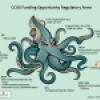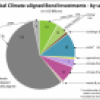Can Project Management Practices Ignite Smart Grid Appeal?
So far U.S. ratepayers aren't taking a fancy to the Smart Grid, whatever that is. At least that’s the premise of an article in the Project Management Institute’s PM Network Magazine (Smart Grids Need a Recharge, October 2011).
Evidence of a faltering grid comes from a Black & Veatch survey of 700 utility executives and managers who point to disinterest and ignorance as the main causes of shallow participation in smart grid programs. If it’s so imperative, then why is its importance being lost on those who need it most?
Typically smart grid programs employ such features as time of use pricing where kilowatts cost more during peak usage times. Another feature is demand response, where machinery, electronic equipment and appliances can be ‘turned down’ during peak hours to stabilize the electric grid and alleviate the need for rolling brownouts or worse, which the utlities say lower ratepayers bills. Customers aren't conviced, but why?
One answer is that the media discussion surrounding smart grid initiatives—whether due to or despite utility intentions—is focused on smart meters. Smart meters enable utilities, and some customers, to monitor energy usage at a more granular level for the purpose of lowering energy costs. For the most part, however, this energy efficiency message isn’t getting across. People don’t understand why they need smart meters or what benefit they can get from them.
In a June Economist Intelligence Unit survey commissioned by UK smart meter provider T-Systems, the article reports that more than half the respondents expected their utility bills would increase, despite the government forecast of a £7.3 billion savings.
Author Sarah Fister Gale advances the premise that utilities need “a well-articulated methodology to obtain, track and review project performance and delivery”. Applying project management practices, she argues, could result in public education initiatives that would deliver buy-in for the smart grid.
While end-users of electricity will ultimately foot the bill for the smart grid in large measure, clarifying just how project management practices like rigorous documentation and creative outreach will significantly corral the diverse stakeholders deserves more attention.
The Black & Veatch survey found that 58% of respondents had a negative perception on utilities’ explanation on the merits of a smarter grid. Yet the road to solving economic, environmental and energy security goes well beyond smart meters, which is where the national conversation seems to have stalled.
Dialog is quivering on a tightrope between the economic viability of government incentives to new cleaner though still nascent energy technologies, such as the smart grid, and allocated subsidies to older, and some would say environmentally unfriendly, but still reliable and powerful ones. Utilities and their commissions are caught in the middle. It’s no wonder customers aren’t applauding.
There is one silver lining in solving the smart grid equation—the entrepreneurial spirit. Technology innovation and education in the U.S. still chimes ‘I can do anything better than you”.




